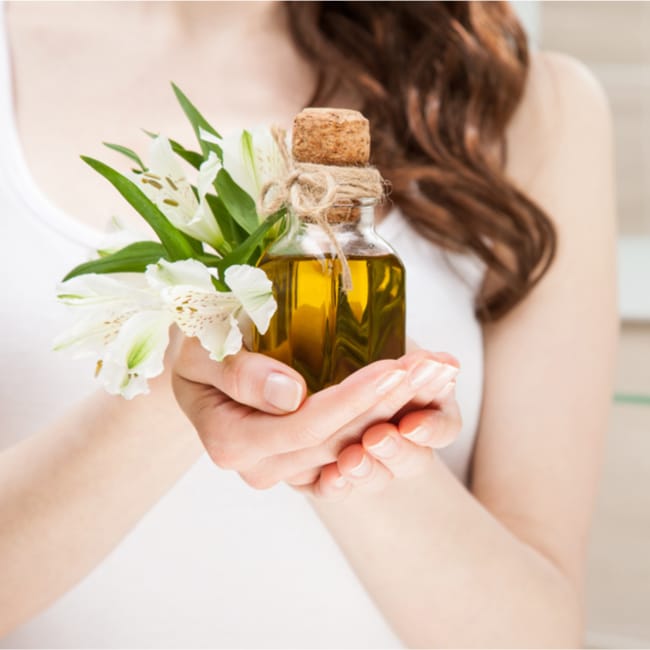With so many different serums and oils out there to choose from, it can feel daunting trying to find the best one that works for you. Your skin may have different needs than someone else, so it is hard to find *one* oil that works for everyone.
We spoke with dermatologists who all pointed towards one oil (that may surprise you) that is especially great for *dry* skin facing the dead of winter. If that sounds like something you’re experiencing, read on to learn more about skin oils in general, and one particular oil that might have several purposes in your daily life, and how it can fit into your skincare routine.
A Quick Breakdown of Oil Products & Skin Types
People have been using oils on their skin “for centuries to promote healthy, younger looking skin,” notes Dr. Cheryl Rosen, Director of Dermatology at BowTied Life. “Some are meant to moisturize and nourish the skin,” she says, while others are meant to “help reduce the appearance of wrinkles or aging.” We’ll be focusing heavily on the latter, but before we do, your skin might fall into one of these three common types— dry, oily or combination.
She says that jojoba oil is especially beneficial for people with oily skin, as it “helps to regulate the production of sebum.” Argan oil is a great choice for people with dry skin, as it helps to “retain moisture in the skin,” and coconut oil can work for people with acne-prone skin, as it helps to “kill bacteria and reduce inflammation.”
There is one commonly-used oil that you might not expect that can really be your best friend this winter, and that is (drumroll…) olive oil! For those of us facing the harsh effects of a bitter January, olive oil can aid us in our anti-aging skincare routines. We spoke with board-certified dermatologist Dr. Heidi Prather, MD, and skincare expert Dr. Rudolf Probst, MD, about the many reasons why olive oil skincare is worth a try this winter.


The Many Benefits of Olive Oil in Skincare
Olive oil is immensely useful in cooking, but you may also be surprised to learn that it can benefit your skin as a cosmetic product as well.
“I recommend olive oil for healthy, young looking skin because it contains vitamins A and E,” explains Probst, who also notes it has fatty acids and other minerals which help in fighting free radicals.
“Olive oil produces collagen which is a protein essential for building our skin,” adds Probst, who suggests massaging olive oil before a bath to improve the circulation of blood and keep the skin moisturized, “thus reducing the signs of aging.”
Prather notes that olive oil is a heavier oil so it may not rub in as readily. “It can be a great adjunct to help remove makeup at night and can be used as a pre-cleanser on your face,” says Prather. “If your skin is more dry and you're not acne-prone, you can even use it with your moisturizer at night.”
Prather’s closing message is that anyone prioritizing an anti-aging skincare routine should make sure that the skin oil they choose is “non-comedogenic or is not going to clog pores, resulting in acne.”
A lot of common oils that we put on our skin can cause acne if we are not careful, she says. “Acne can be from the oil itself causing congestion in the skin or even bacterial contamination of the oil if it is not stored properly.”
Overall, different skin types will require different oils for their own specific needs, but olive oil can be a great one to try if you’re facing very dry skin as the result of winter. For more information on any particular oil or to find your skin type, visit your local dermatologist and see what works best for you.


























